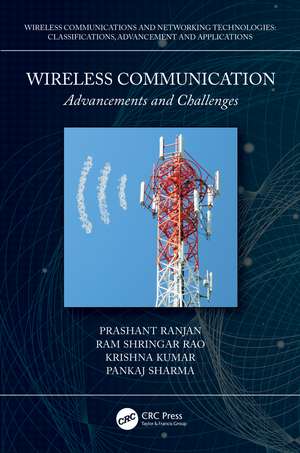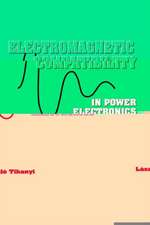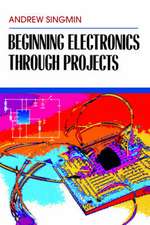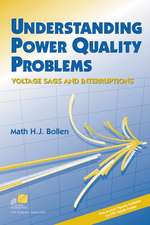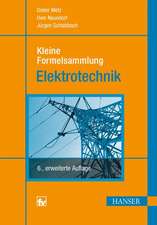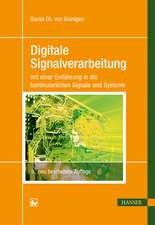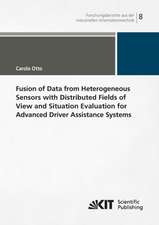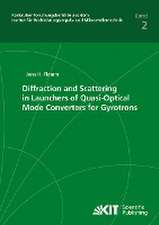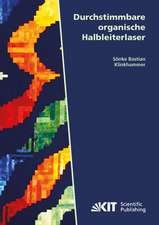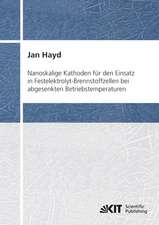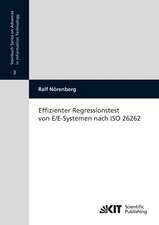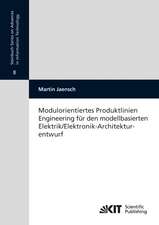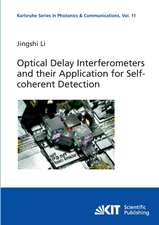Wireless Communication: Advancements and Challenges: Wireless Communications and Networking Technologies
Autor Prashant Ranjan, Ram Shringar Rao, Krishna Kumar, Pankaj Sharmaen Limba Engleză Paperback – 8 oct 2024
The text discusses the cellular concepts of 4G, 5G, and 6G along with their challenges. It covers topics related to vehicular technology, wherein vehicles communicate with the traffic and the environment around them using short-range wireless signals. The text comprehensively covers important topics including use of the Internet of Things (IoT) in wireless communication, architecture, and protocols. It further covers the role of smart antennas in emerging wireless technologies.
The book
- Discusses advanced techniques used in the field of wireless communication.
- Covers technologies including network slicing, 5G wireless communication, and TV white space technology.
- Discusses practical applications including drone delivery systems, public safety, IoT, virtual reality, and smart cities.
- Covers radio theory and applications for wireless communication with ranges of centimeters to hundreds of meters.
- Discusses important topics including metamaterials, inductance coupling for loop antennas, bluetooth low energy, wireless security, and wireless sensor networks.
| Toate formatele și edițiile | Preț | Express |
|---|---|---|
| Paperback (1) | 310.53 lei 6-8 săpt. | |
| CRC Press – 8 oct 2024 | 310.53 lei 6-8 săpt. | |
| Hardback (1) | 686.35 lei 6-8 săpt. | |
| CRC Press – 10 aug 2022 | 686.35 lei 6-8 săpt. |
Preț: 310.53 lei
Preț vechi: 355.69 lei
-13% Nou
Puncte Express: 466
Preț estimativ în valută:
59.42€ • 62.48$ • 49.10£
59.42€ • 62.48$ • 49.10£
Carte tipărită la comandă
Livrare economică 17 aprilie-01 mai
Preluare comenzi: 021 569.72.76
Specificații
ISBN-13: 9781032020655
ISBN-10: 1032020652
Pagini: 196
Ilustrații: 170
Dimensiuni: 156 x 234 mm
Greutate: 0.36 kg
Ediția:1
Editura: CRC Press
Colecția CRC Press
Seria Wireless Communications and Networking Technologies
Locul publicării:Boca Raton, United States
ISBN-10: 1032020652
Pagini: 196
Ilustrații: 170
Dimensiuni: 156 x 234 mm
Greutate: 0.36 kg
Ediția:1
Editura: CRC Press
Colecția CRC Press
Seria Wireless Communications and Networking Technologies
Locul publicării:Boca Raton, United States
Public țintă
Academic, Postgraduate, Professional, and Undergraduate AdvancedNotă biografică
Dr. Prashant Ranjan is presently working as an Associate Professor in the Department of Electronics and Communication Engineering, University of Engineering and Management Jaipur, Rajasthan, India. He received his M.Tech and Ph.D. degree from Motilal Nehru National Institute of Technology Allahabad, Prayagraj, Uttar Pradesh, India. He has more than 5 Years of teaching experience. He has published numerous research papers in international journals and conferences, including IEEE, Elsevier, Taylor and Francis. His present area of research includes the design and development of UWB filtering antennas, vehicle- to- vehicle wireless technology, Non-Invasive RF Sensors, Agricultural & Medical Applications.
Dr. Ram Shringar Rao received his Ph.D. (Computer Science and Technology) from School of Computer and Systems Sciences, Jawaharlal Nehru University, New Delhi, India. He has obtained his M. Tech (IT) and B. E. (CSE) 2005 and 2000 respectively. He has worked as an Associate Professor in the Department of Computer Science, Indira Gandhi National Tribal University (A Central University, MP) from April 2016 to March 2018. He is currently working in the Department of Computer Science and Engineering of Netaji Subhas University of Technology, East Campus, Delhi, India. He has more than 18 years of teaching, administrative and research experience. Currently, he is associated with a wide range of journals and conferences as chief editor, editor, chairs and members. Dr. Rao has published more than 100 research papers including edited books with good impact factors in reputed International Journals and Conferences including IEEE, Elsevier, Springer, Wiley & Sons, Taylor & Francis, IERI Letters, American Institute of Physics, etc. He has supervised 25 M. Tech and 04 PhD students for their dissertation and thesis work. His current research interest includes Mobile Ad hoc Networks, Vehicular Ad hoc Networks, Flying Ad-hoc Networks and Cloud Computing.
Mr. Krishna Kumar is presently working as a Research and Development Engineer at UJVN Ltd. Before joining UJVNL. He has worked as Assistant Professor at BTKIT, Dwarahat. He received his B.E. (Electronics and Communication Engineering) from Govind Ballabh Pant Engineering College, Pauri Garhwal, M.Tech (Digital Systems) from Motilal Nehru NIT Allahabad. He is presently pursuing a degree in his Ph.D. from the Indian Institute of Technology, Roorkee. He has more than 11 years of experience and has published numerous research papers in international journals like IEEE, Elsevier, Taylor & Francis, Springer, and Wiley. His research area includes Renewable Energy and Artificial Intelligence.
Mr. Pankaj Sharma is M.Sc. (Physics), M.Tech. (Microwave Electronics) from University of Delhi & MBA from Lancaster University (UK). He was a senior researcher at A*STAR (Singapore’s premium research organization) and developed many wireless communication technologies & products with Indian and Singapore technology companies. He led many deployment projects in many countries. He filed many patents and published various research papers in reputed journals and conferences. He is currently CTO & Co-Founder of Whizpace Pvt. Ltd., a spin-off from A*STAR and running the company and secured many projects in Singapore & overseas, connecting the unconnected. Harnessing the power of TV White Space technology.
Dr. Ram Shringar Rao received his Ph.D. (Computer Science and Technology) from School of Computer and Systems Sciences, Jawaharlal Nehru University, New Delhi, India. He has obtained his M. Tech (IT) and B. E. (CSE) 2005 and 2000 respectively. He has worked as an Associate Professor in the Department of Computer Science, Indira Gandhi National Tribal University (A Central University, MP) from April 2016 to March 2018. He is currently working in the Department of Computer Science and Engineering of Netaji Subhas University of Technology, East Campus, Delhi, India. He has more than 18 years of teaching, administrative and research experience. Currently, he is associated with a wide range of journals and conferences as chief editor, editor, chairs and members. Dr. Rao has published more than 100 research papers including edited books with good impact factors in reputed International Journals and Conferences including IEEE, Elsevier, Springer, Wiley & Sons, Taylor & Francis, IERI Letters, American Institute of Physics, etc. He has supervised 25 M. Tech and 04 PhD students for their dissertation and thesis work. His current research interest includes Mobile Ad hoc Networks, Vehicular Ad hoc Networks, Flying Ad-hoc Networks and Cloud Computing.
Mr. Krishna Kumar is presently working as a Research and Development Engineer at UJVN Ltd. Before joining UJVNL. He has worked as Assistant Professor at BTKIT, Dwarahat. He received his B.E. (Electronics and Communication Engineering) from Govind Ballabh Pant Engineering College, Pauri Garhwal, M.Tech (Digital Systems) from Motilal Nehru NIT Allahabad. He is presently pursuing a degree in his Ph.D. from the Indian Institute of Technology, Roorkee. He has more than 11 years of experience and has published numerous research papers in international journals like IEEE, Elsevier, Taylor & Francis, Springer, and Wiley. His research area includes Renewable Energy and Artificial Intelligence.
Mr. Pankaj Sharma is M.Sc. (Physics), M.Tech. (Microwave Electronics) from University of Delhi & MBA from Lancaster University (UK). He was a senior researcher at A*STAR (Singapore’s premium research organization) and developed many wireless communication technologies & products with Indian and Singapore technology companies. He led many deployment projects in many countries. He filed many patents and published various research papers in reputed journals and conferences. He is currently CTO & Co-Founder of Whizpace Pvt. Ltd., a spin-off from A*STAR and running the company and secured many projects in Singapore & overseas, connecting the unconnected. Harnessing the power of TV White Space technology.
Cuprins
Chapter 1: Internet of Things (IoT)
1.1 Introduction
1.2 The Continuing Evolution of IoT
1.3 The Key Drivers of Rapid Adoption of IoT
1.4 How Does IoT Work
1.5 Importance of IoT
1.6 Benefits of IoT to Businesses
1.7 Potential of IoT
1.8 Architecture of IoT
1.9 IoT Standards and Frameworks
1.10 Enabling Technologies for IoT
1.11 Future Technological Developments for IoT
1.12 Future Application Areas
1.13 Pros and Cons of IoT
1.14 IoT Security and Privacy Issues
1.15 Tips to Help Secure User’s Smart Home and IoT Devices
1.16 Future Challenges for IoT
1.17 Conclusion
Chapter 2: Application of IoT for Pandemic Detection
2.1 Introduction
2.2 Emergency Care System
2.3 Previous Works
2.4 Application of IoT and Smart Technology for Pandemic Detection
2.5 Conclusion
Chapter 3: TV White Space (TVWS) Technology
3.1 Introduction
3.2 Underutilized Spectrum
3.3 Evolution of TVWS
3.4 Standardization of TVWS
3.5 Regulations on TVWS
3.6 The Limitations of TVWS Regulation
3.7 Commercial Pilots and Trials of TVWS
3.8 Applications and Use Cases of TVWS
3.9 SWOT Analysis
3.10 Conclusion
Chapter 4: Health Monitoring and Pandemic Detection using IoT and Wireless Communication Technologies
4.1 Introduction
4.2 Previous Works
4.3 Proposed Model
4.4 Conclusions
Chapter 5: V2V: The Future of VANET’s Communications
5.1 Vehicular Ad-hoc Network (VANET)
5.2 Communication Domains of VANET
5.3 VANET’s Characteristics
5.4 VANET’s Challenges
5.5 VANET Applications
5.6 Vehicle-to-Vehicle Communication (V2V)
5.7 Working of V2V Communication
5.8 Benefits of V2V Communications
5.9 V2V Tracking and Reporting
5.10 V2V Security in Communication
5.11 Future of V2V Communication
5.12 Conclusion
Chapter 6: IoT Based Flood Control and Disaster Management System for Dam and Barrage
6.1 Introduction
6.2 Investigations on Dam and Barrage Monitoring
6.3 Circuit Configuration for Monitoring and Control of Dam/Barrage
6.4 Conclusions
Chapter 7: An Overview of Smart Antenna Technology for Wireless Communication
7.1 Introduction
7.2 Smart Antenna
7.3 Advantages and Disadvantages of Smart Antennas
7.4 Types of Smart Antenna System
7.5 Difference Between Switched Beam System and Digitally Adaptive Beamforming System
7.6 Applications of Smart Antenna System
7.7 Conclusion
Chapter 8: UAV: Communication and Object Detection System
8.1 Introduction
8.2 Application Scenarios of UAVs
8.3 Major Issues and Challenges of UAVs
8.4. UAV Communication
8.5 Conclusion
Chapter 9: Smart Pole System: A Connectivity to City Services
9.1 Introduction
9.2 Limitations of Conventional Pole System
9.3 Benefits of Smart Pole System
9.4 Smart Pole System Design
9.5 Conclusion
1.1 Introduction
1.2 The Continuing Evolution of IoT
1.3 The Key Drivers of Rapid Adoption of IoT
1.4 How Does IoT Work
1.5 Importance of IoT
1.6 Benefits of IoT to Businesses
1.7 Potential of IoT
1.8 Architecture of IoT
1.9 IoT Standards and Frameworks
1.10 Enabling Technologies for IoT
1.11 Future Technological Developments for IoT
1.12 Future Application Areas
1.13 Pros and Cons of IoT
1.14 IoT Security and Privacy Issues
1.15 Tips to Help Secure User’s Smart Home and IoT Devices
1.16 Future Challenges for IoT
1.17 Conclusion
Chapter 2: Application of IoT for Pandemic Detection
2.1 Introduction
2.2 Emergency Care System
2.3 Previous Works
2.4 Application of IoT and Smart Technology for Pandemic Detection
2.5 Conclusion
Chapter 3: TV White Space (TVWS) Technology
3.1 Introduction
3.2 Underutilized Spectrum
3.3 Evolution of TVWS
3.4 Standardization of TVWS
3.5 Regulations on TVWS
3.6 The Limitations of TVWS Regulation
3.7 Commercial Pilots and Trials of TVWS
3.8 Applications and Use Cases of TVWS
3.9 SWOT Analysis
3.10 Conclusion
Chapter 4: Health Monitoring and Pandemic Detection using IoT and Wireless Communication Technologies
4.1 Introduction
4.2 Previous Works
4.3 Proposed Model
4.4 Conclusions
Chapter 5: V2V: The Future of VANET’s Communications
5.1 Vehicular Ad-hoc Network (VANET)
5.2 Communication Domains of VANET
5.3 VANET’s Characteristics
5.4 VANET’s Challenges
5.5 VANET Applications
5.6 Vehicle-to-Vehicle Communication (V2V)
5.7 Working of V2V Communication
5.8 Benefits of V2V Communications
5.9 V2V Tracking and Reporting
5.10 V2V Security in Communication
5.11 Future of V2V Communication
5.12 Conclusion
Chapter 6: IoT Based Flood Control and Disaster Management System for Dam and Barrage
6.1 Introduction
6.2 Investigations on Dam and Barrage Monitoring
6.3 Circuit Configuration for Monitoring and Control of Dam/Barrage
6.4 Conclusions
Chapter 7: An Overview of Smart Antenna Technology for Wireless Communication
7.1 Introduction
7.2 Smart Antenna
7.3 Advantages and Disadvantages of Smart Antennas
7.4 Types of Smart Antenna System
7.5 Difference Between Switched Beam System and Digitally Adaptive Beamforming System
7.6 Applications of Smart Antenna System
7.7 Conclusion
Chapter 8: UAV: Communication and Object Detection System
8.1 Introduction
8.2 Application Scenarios of UAVs
8.3 Major Issues and Challenges of UAVs
8.4. UAV Communication
8.5 Conclusion
Chapter 9: Smart Pole System: A Connectivity to City Services
9.1 Introduction
9.2 Limitations of Conventional Pole System
9.3 Benefits of Smart Pole System
9.4 Smart Pole System Design
9.5 Conclusion
Descriere
The reference text covers advanced wireless communication technologies and challenges in a comprehensive manner. It will be an ideal reference text for senior undergraduate, graduate students, and professional in the fields of electrical engineering, and electronics and communication engineering.
